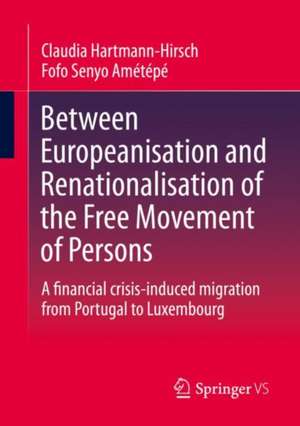Between Europeanisation and Renationalisation of the Free Movement of Persons: A financial crisis-induced migration from Portugal to Luxembourg
Autor Claudia Hartmann-Hirsch, Fofo Senyo Amétépéen Limba Engleză Paperback – 10 aug 2023
Preț: 493.70 lei
Preț vechi: 580.83 lei
-15% Nou
Puncte Express: 741
Preț estimativ în valută:
94.50€ • 102.68$ • 79.43£
94.50€ • 102.68$ • 79.43£
Carte tipărită la comandă
Livrare economică 21 aprilie-05 mai
Preluare comenzi: 021 569.72.76
Specificații
ISBN-13: 9783658408138
ISBN-10: 3658408138
Ilustrații: XIII, 181 p. 14 illus.
Dimensiuni: 148 x 210 mm
Greutate: 0.26 kg
Ediția:1st ed. 2023
Editura: Springer Fachmedien Wiesbaden
Colecția Springer VS
Locul publicării:Wiesbaden, Germany
ISBN-10: 3658408138
Ilustrații: XIII, 181 p. 14 illus.
Dimensiuni: 148 x 210 mm
Greutate: 0.26 kg
Ediția:1st ed. 2023
Editura: Springer Fachmedien Wiesbaden
Colecția Springer VS
Locul publicării:Wiesbaden, Germany
Cuprins
Luxembourg's atypical migration.- Nation state, EU, migration: a systems theory approach.- Luxembourg - Portugal: push-and-pull factors.- Statistical analysis of the 'new' Portuguese.- Europeanisation and renationalisation, restrictions on free movement.- Qualitative interviews with social partners, political parties and NGOs.
Notă biografică
Dr. Claudia Hartmann-Hirsch and Dr. Fofo Senyo Amétépé have worked at LISER (Luxembourg Institute of Socio-Economic Research) on migration-related topics, in particular on Luxembourg's atypical migration structure. Fofo Senyo Amétépé is currently working at STATEC (Institut national de la statistique et des études économiques du Grand-Duché de Luxembourg).
Textul de pe ultima copertă
Luxembourg benefits from an atypical, highly efficient migration. The most recently arrived Portuguese migrants position themselves on the bottom of the socio-economic scale in the same way as their predecessors of the Salazar regime - despite their higher educational attainment. The strong north-south divide between Luxembourg and Portugal is illustrated by a number of indicators. Freedom of movement is reduced and renationalised by ECJ rulings on the initiative of northern member states against southern European crisis ‘refugees’. The categories of EU citizens versus third country nationals develop into economically strong EU and non-EU migrants versus weak EU and non-EU migrants.
The authors Dr. Claudia Hartmann-Hirsch and Dr. Fofo Senyo Amétépé have worked at LISER (Luxembourg Institute of Socio-Economic Research) on migration related topics, in particular on Luxembourg’s atypical migration structure. Fofo Senyo Amétépé is currently working at STATEC (Institut national de la statistique et des études économiques du Grand-Duché de Luxembourg).
This book is a translation of an original German edition. The translation was done with the help of artificial intelligence (machine translation by the service DeepL.com). A subsequent human revision was done primarily in terms of content, so that the book will read stylistically differently from a conventional translation.
The authors Dr. Claudia Hartmann-Hirsch and Dr. Fofo Senyo Amétépé have worked at LISER (Luxembourg Institute of Socio-Economic Research) on migration related topics, in particular on Luxembourg’s atypical migration structure. Fofo Senyo Amétépé is currently working at STATEC (Institut national de la statistique et des études économiques du Grand-Duché de Luxembourg).
This book is a translation of an original German edition. The translation was done with the help of artificial intelligence (machine translation by the service DeepL.com). A subsequent human revision was done primarily in terms of content, so that the book will read stylistically differently from a conventional translation.
Caracteristici
A study in the sociology of migration A systems-theoretical approach to migration in the EU On the restrictions on freedom of movement
